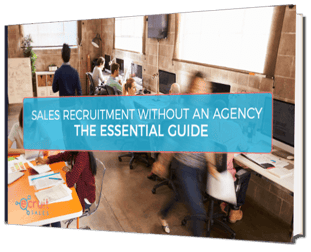Sales jobs have become fiercely competitive; a small talent pool means that businesses are competing against each other for the top salespeople on a regular basis. Consequently, hiring managers are under tremendous pressure to find the right sales talent for the business before they are snapped up by the competition, and, as a result, might make rash hiring decisions in a bid to fill the role as quickly as possible – and get that salesperson started.
The thing is, Sales roles, according to ManpowerGroup’s 2016/2017 Talent Shortage Survey, are the third hardest roles to fill globally, behind Skilled Trades and IT. It’s not just finding the talent that’s the issue, but finding the right talent.
On that basis, to identify the top sales talent, hiring managers need to ensure that their interview process is a mix of both behavioural and skill-based components, allowing them to assess candidates comprehensively and determine suitability. In the first part of this two-part blog series, we tackle the best sales interview questions to ask..
1. How do you keep up to date with industry trends and your target market?
No matter the market, sales candidates should always stay abreast of changes and practices occurring across the sales industry as a whole, as well as within their specific sales function. Having an awareness of trends, changes and practices will enable them to grow, gain experience and have the competitive edge. They might read sales-specific blogs, engage on social media converse with colleagues, or read industry magazines; regardless, it all helps to keep ahead of the curve!
In addition, comprehensive general and industry specific sales knowledge demonstrates that they are interested in a sales career. Also, the level of research a candidate conducts into a sales role is indicative of their passion for the industry and how much they want to succeed.
2. What is your greatest career achievement?
The idea of this question is to get an idea of what candidates value as a “career achievement” and shows if they have done something truly impressive. It’s an opportunity for you to probe how well the candidate knows their numbers; a salesperson will typically talk about driving growth, increasing sales as that’s the overall objective of their role but, ideally, you want them to be able to validate those assertions with hard facts. Most salespeople will be able to back up their achievements and describe them in detail to you.
3. Explain and formulate an argument on a controversial subject that people rarely agree with you on
The idea isn’t to trip the candidate up or paint them as an insensitive individual but to understand how well they can formulate and present a compelling and persuasive argument in a formal space. Just as critical thinking and debate is encouraged in academic environments, in a sales role you need candidates to be able to persuade sales prospects and clearly outline a proposition.
It also showcases their ability to be diplomatic and pragmatic in a formal environment – again, it’s not about tripping up the candidate, but understanding how well they can put across an idea.
4. What are the three key pieces of information you use to qualify prospects?
The candidate should be able to identify the most important aspects right away. For example, if they don’t know the client’s budget or business problem, those questions need to be asked first – if not, how can they tailor their solutions to meet the client’s needs?
In the modern sales process, some salespeople can get caught up with asking too many of the wrong questions, questions that don’t qualify interest, intent or need. Having a conversation and empathising with sales prospects is essential, true, but getting the right information at the start will put you in a much better position to sell. You can’t be a good salesperson if you can’t qualify potential prospects!
5. Can you give me an example of when you have overcome a customer objection?
The reason why you’d be asking this question is because it’s about listening to customers, influencing them with a structured argument and then persuading them to take your perspective on the matter. The best salespeople take the customer’s pain points on board and then identify the possible solutions after assessing those problems. There’s no one-size-fits all approach to customer support and service and the best salespeople recognise this and adapt to combat the issue. Candidates should be able to demonstrate that they are able to listen to clients, persuade them and then adapt their service offering to suit the client’s needs.
That concludes the first part of our two-part blog series on top sales interview questions to ask. Stay tuned for the next part and ensure you apply these questions to your interview process!

.png?width=206&height=60&name=Untitled%20design%20(31).png)




